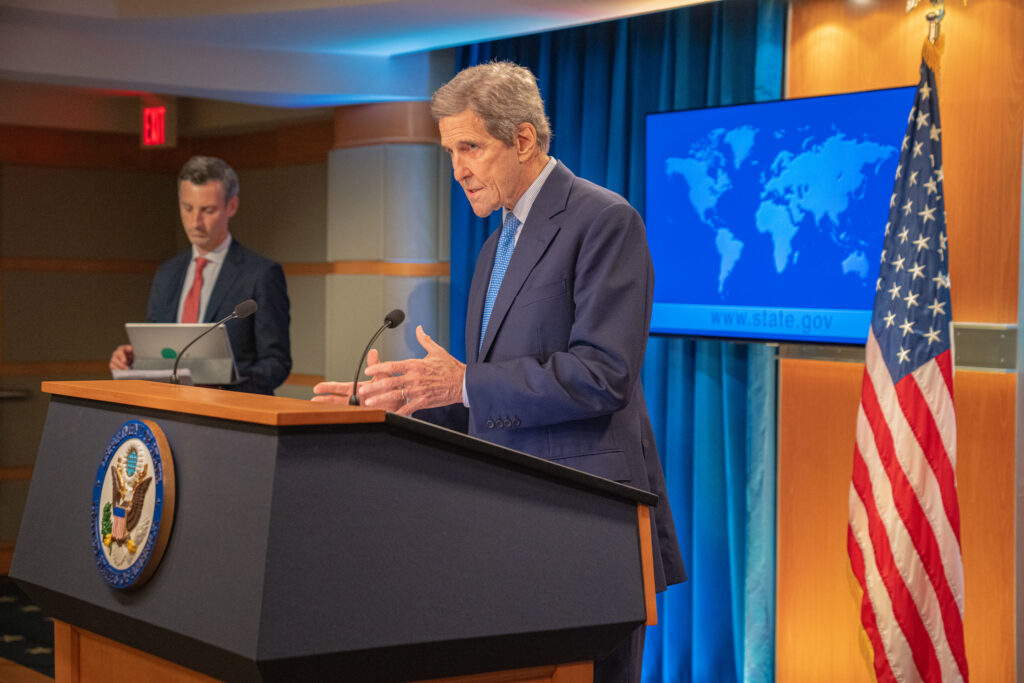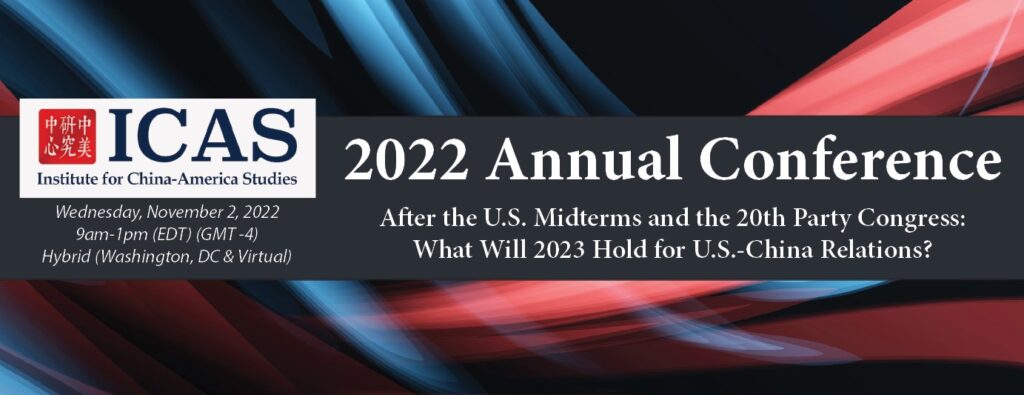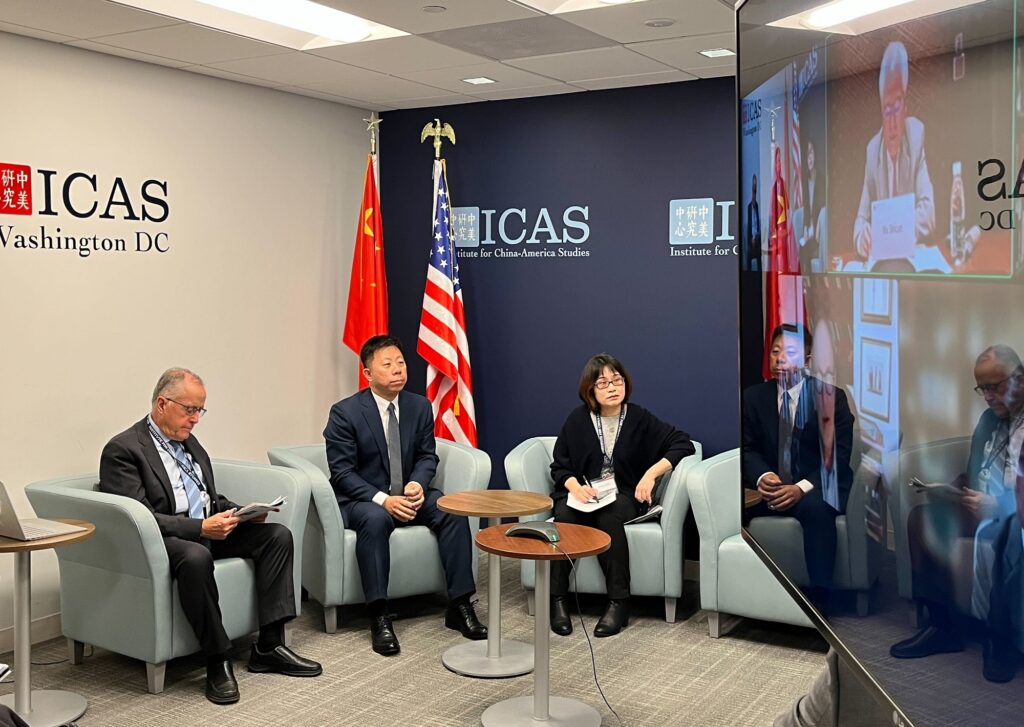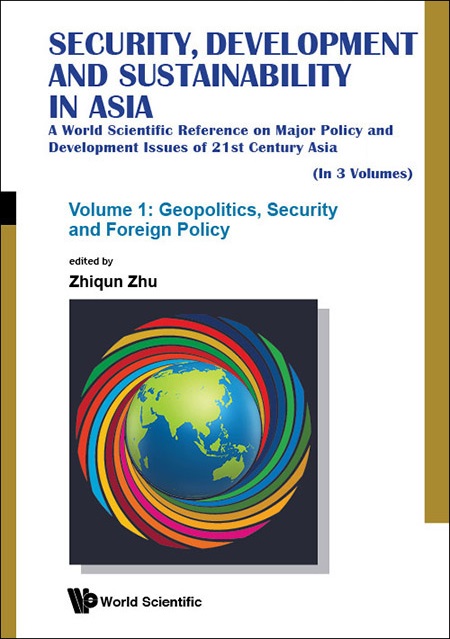
ICAS Bulletin (online ISSN 2836-3418, print ISSN 2836-340X) is published every other week throughout the year at 1919 M St NW, Suite 310, Washington, DC 20036.
The online version of ICAS Bulletin can be found at chinaus-icas.org/bulletins/.

– China’s Xi Jinping made a direct criticism towards Putin’s war in Ukraine—warning not to use nuclear weapons—marking the first direct criticism since the start of the conflict.
– The U.S. and Chinese governments look to arrange a summit between Xi Jinping and Joe Biden in November around the G-20 summit, despite the rising tensions and cancellation of several in-person meetings.
– U.S. Secretary of State Anthony Blinken told China’s Foreign Minister Wang Yi that U.S.-Chinese relations must “return to a normal track.”
– Xi Jinping said on Chinese state media that the U.S. and China “must find ways to get along.”
– In late October, Secretary Blinken accused Beijing of “speeding up” their process of reunification with Taiwan despite Beijing’s consistent denial that they have no plans to speed up the reunification process of Taiwan.
– Despite an overall halt in bilateral negotiations, U.S. and Chinese climate envoys have continued some forms of communications on curbing methane and accelerating the green transition.
Associated News References:
“China’s Xi warns Putin not to use nuclear arms in Ukraine,” Politico, November 4
“A Biden-Xi Summit presents Latest Challenge to U.S.-China Ties” The Wall Street Journal, November 3 [Paywall]
“China-US relations: is Wang Yi, Blinken call a step to Xi-Biden summit?” South China Morning Post, October 31 [Paywall]
“Xi Jinping says China and SU must ‘find ways to get along’” Al Jazeera, October 27
“China Wants to ‘Speed Up’ Its Seizure of Taiwan, US’s Blinken Says,” Bloomberg, October 26 [Paywall]
“US and Chinese Climate Envoys in Contact Despite Halt to Talks,” Bloomberg, October 25 [Paywall]

– Apple has warned that the Chinese zero-COVID restrictions have caused a “significantly reduced capacity” in their factories, hinting that it has hurt iPhone production.
– The U.S. and Netherlands hold talks on restricting China’s access to advanced chips technologies, Washington looks to block ASML Holding from supplying China.
– U.S. Federal Communications Commissioner Brendan Carr visited Taipei for meetings on 5G, cybersecurity, and telecoms to show U.S. support for Taiwan.
– Decoupling of global supply chains will cause severe economic repercussions in the tech sector, as a consequence of a downturn in U.S.-Chinese relations.
– The Biden administration is weighing controls on Chinese technology, including adding export restrictions to industries like biotechnology and algorithms.
– The Biden administration expects to make a deal with allies to globalize new rules on Chinese access to chip making tools.
Associated News References:
“Nvidia to Sell New Chip in China It Says Meets US Export Ban,” Yahoo!Finance, November 7
“Apple warns Covid restrictions in China are hurting iPhone production,” CNBC, November 6
“US to Amp Up Pressure on Dutch to Block Chip Gear Sales to China,” Bloomberg, November 2 [Paywall]
“U.S. FCC commissioner visits Taiwan to discuss cybersecurity, telecoms,” Reuters, November 2 [Paywall]
“US-China decoupling ‘expensive’, warns Japan chipmaker executive,” Financial Times, October 29 [Paywall]
“The Biden Administration is weighing further controls on Chinese technology,” The New York Times, October 27 [Paywall]
“Biden administration expects deal with allies on China export curbs soon,” Reuters, October 27 [Paywall]

– The Biden administration appears to aim at asserting itself as a global leader on climate action at COP27, pursuing a diplomatic face off with China.
– The U.S. and allies have spoken against China and Russia at the United Nations, accusing both of preventing United Nations Security Council action against North Korea’s weapon usage.
– China’s foreign ministry pinned responsibility on the U.S. for the deterioration of U.S.-Chinese climate talks.
– There is increased concern around rhetoric usage in the U.S.-Chinese relations, with many analysts now stating that increasing tensions through rhetoric can be “sloppy”.
– Analysts have raised concern over the United States’ previous treatment towards the Chinese Ambassador Qin Gang, who has increasingly become involved with policy-making in the Chinese Communist Party.
– The U.S. has accused China of resisting nuclear talks after China placed a new emphasis on policies to boost nuclear deterrence.
– The Biden Administration’s new National Security Strategy, released at the end of October, casts China as the greatest danger to American security and indicates policies to seemingly increase bilateral tensions.
– The Chinese ambassador to South Korea blamed the U.S. for dividing relations between Seoul and Beijing, saying the U.S. is “the biggest external challenge” to their bilateral relations.
Associated News References:
“U.S.- China global influence battle takes center stage at COP27” Politico, November 6
“US confronts China, Russia at UN over N Korean missile launches,” Al Jazeera, November 5
“China says U.S. must ‘take responsibility’ for breakdown in climate ties” Reuters, November 4 [Paywall]
“‘Sloppy’ US Talk on China’s Threat Worries Some Skeptical Experts,” Bloomberg, November 3 [Paywall]
“Biden froze out China’s ambassador. He may regret that.” Politico, November 2
“U.S. says China resisting nuclear talks after Xi vow to boost deterrent,” Reuters, November 1 [Paywall]
“US Defense Strategy Casts China as Greatest Danger to American Security” The Wall Street Journal, October 27 [Paywall]
“China envoy blasts US for dividing Seoul and Beijing,” South China Morning Post, October 26 [Paywall]

– Chinese markets had a massive surge over the past week due to hopes of improving ties with the U.S. and rumors on a possible relaxing of COVID regulations in China.
– U.S. audit inspectors finished on-site inspections of Chinese companies faster than initially anticipated, marking a strong rise in Chinese markets.
– China’s foreign ministry released a statement that the U.S. has “no right” to interfere with Chinese-German cooperation.
– European car makers look to hold economic stability in Chinese and U.S. markets as European markets fall in response to the war in Ukraine.
– Foreign Investors cut their holdings of yuan-denominated bonds for the eighth consecutive month, causing the yuan to have its longest losing streak since 1994.
– U.S. trade officials have asked their European counterparts to consider export controls on China, despite overall European disinterest in Chinese export controls.
– According to the AmCham Shanghai 2022 poll, the number of American companies expecting annual revenue growth plunged by 29 percentage points this year to 47%, from 82.2% in 2021 amid the zero-Covid rules effects on operations.
Associated News References:
“Chinese Markets Surge on Hopes of Better Ties with US,” Financial Times, November 5 [Paywall]
“China Stocks Surge as US Audit Inspectors Finish On-Site Work Ahead of Plan” Bloomberg, November 4 [Paywall]
“China says U.S. has ‘no right’ to interfere in Hamburg port deals,” Reuters, November 3 [Paywall]
“Europe’s Car Makers Lean on U.S., China as They Brace for Recession,” The Wall Street Journal, November 3 [Paywall]
“China’s foreign capital outflow quickened pace, as yuan suffers longest losing streak since 1994,” South China Morning Post, October 31 [Paywall]
“US Asks Europe to Consider Export Controls on China” Bloomberg, October 31 [Paywall]
“US companies’ sales forecasts drop to 10-year low in AmCham Shanghai’s 2022 poll, as zero-Covid rules upend operations,” South China Morning Post, October 28 [Paywall]

– After the recent COVID-19 outbreaks persisted in China, causing Foxconn to adjust its forecast, Apple Inc. released its own warnings of delays for some new iPhones.
– Nieng Yan, dubbed “China’s goddess scientist,” has left Princeton to return to China sparking Chinese rallying behind patriotic moves from the academic amid a trade war.
– Shanghai Disneyland barred visitors from leaving in accordance to zero-COVID polities, leaving many stranded in the park until a negative test could be provided.
– The China Project, a New York-based, China-focused news, information, and business services platform, is being investigated by the U.S. Republican lawmakers for claims of having ties to the Chinese government.
– The Chinese foreign ministry office in Hong Kong described U.S. support for Hong Kong media tycoon Jimmy Lai, as proof of “sinister intentions” to destroy the city’s prosperity.
– 1,400 U.S.-based ethnic Chinese scientists have left U.S. institutions in favor of academic institutions in mainland China, showcasing trends of discrimination in the U.S. and desires for academics to return to mainland China.
Associated News References:
“Apple iPhone Assembler Tried to Ease Worker Fears About Covid—It Led to a Tighter Lockdown,” The Wall Street Journal, November 8 [Paywall]
“China’s ‘goddess scientist who left for US Ivy League job is coming home to set up medical academy – to the delight of the nation,” South China Morning Post, November 2 [Paywall]
“Shanghai Disney: Visitors unable to leave without negative Covid test as park shuts” BBC News, October 31
“A former employee’s complaint prompts Republican calls to investigate The China Project, an American news company,” Semafor, October 30
“Beijing hits back at US politicians in war of words over fraud conviction for Hong Kong media tycoon Jimmy Lai” South China Morning Post, October 26 [Paywall]
“At least 1,400 US-based ethnic Chinese scientists exited American institutions for mainland China, study reveals” South China Morning Post, October 20 [Paywall]
“WTA Chief Talks Money, China and Why Tennis Needs More Female Coaches,” The New York Times, November 7 [Paywall]
“Former U.S. Military Pilot Sentenced for Acting as Paid Agent of the Government of the People’s Republic of China and Lying on National Security Background Forms,” U.S. Department of Justice, November 7
“US-China report recommends backchannel diplomacy with Chinese military,” DefenseNews, November 2
“China slams reported plan for US B-52 bombers in Australia,” Associated Press, October 31
“U.S. Pensions Take a Fresh Look at China,” The Wall Street Journal, October 29 [Paywall]
“U.S. Military conducts hypersonic missile launch experiments at Virginia facility,” Fox News, October 26
“China tops U.S. for first time in this rankings of the world’s ‘best’ universities,” Market Watch, October 25
November 4 hosted by South China Morning Post
November 3 hosted by Foreign Policy
November 1 hosted by Foreign Policy
October 27 hosted by Center for a New American Security
October 26 hosted by The China Project
October 26 hosted by US-China Business Council
November 17 hosted by Center for Strategic and International Studies
November 18 hosted by Harvard University
November 9 hosted by Brookings
November 9 hosted by The Heritage Foundation
November 9 hosted by the Carnegie Endowment for International Peace
On November 2nd, the Institute for China-America Studies (ICAS) organized its 2022 Annual Conference. Given the lingering effects of the COVID-19 pandemic, the conference was conducted in a hybrid mode with a mix of in-person and virtual participation, and with a virtual audience tuning in from both sides of the Pacific. The conference was opened by Dr. Hong Nong, Executive Director of ICAS and the introductory remarks were delivered by Dr. Wu Shicun, Chairman of ICAS’ advisory board. In his remarks, Dr. Wu lamented the fact that despite the hope that the Biden administration would gradually return the U.S.-China relationship to a more normalized path of common cooperation, this has not turned out to be the case. He noted that the United States and China are not a democracy and an autocracy that are fated to indulge in ‘extreme competition’ but are two major countries that share an important responsibility to mutually uphold peace, prosperity and stability in Asia and the world. He urged the two sides to once again re-establish contacts, damaged by the regrettable Pelosi visit to Taipei, and summon the resolve to work constructively to tackle the common bilateral, regional and global challenges. Hopefully, President Xi and President Biden will seek inspiration in the relationship that Chairman Mao and President Nixon forged 50 years ago and will inaugurate a new era of ‘stable, constructive and cooperative coexistence’ that lasts for the next decade and beyond.


KEYNOTE DIALOGUE: Mr. Jing Quan (Minister, Embassy of the PRC) and Ms. Susan Thornton (Yale University) MODERATOR: Gordon Houlden, China Institute, University of Alberta | |
PANEL I: U.S.-CHINA STRATEGIC RIVALRY IN THE BIDEN ERA SPEAKERS: – Michael Swaine, Quincy Institute for Responsible Statecraft – Dennis Wilder, Georgetown University – Da Wei, Tsinghua University – Huang Jing, Shanghai International Studies University MODERATOR: Gordon Houlden, China Institute, University of Alberta | PANEL II: U.S.-CHINA TRADE AND TECHNOLOGY DECOUPLING SPEAKERS: – Paul Triolo, Albright Stonebridge Group – Huang Yukon, Carnegie Endowment for International Peace – William Reinsch, Center for Strategic & International Studies – Denis Simon, Duke University MODERATOR: Liu Yawei, The Carter Center |
November 3, 2022
Washington, DC & Virtual
On Thursday, November 3, 2022, the 4th China-U.S.-Canada Trilateral Relations Roundtable was held in a hybrid format, with some participants joining via Zoom and others gathering at the ICAS office in Washington, DC. Conducted under Chatham House rules, the roundtable consisted of two panels—one on Politics & Security and the other on Trade, Technology & Climate. In each panel, participants from Canada, the United States and China contributed their own expertise on a related topic of their choice. The panelist presentations were then followed by a moderated group question and discussion time. The event also included introductory and closing remarks by senior officials from the institutions co-sponsoring the roundtable: the National Institute for South China Sea Studies, the Carter Center, and the China Institute, University of Alberta…
By Sourabh Gupta
October 25, 2022
Almost five years to the day that he inaugurated a ‘new era of socialism with Chinese characteristics’, General Secretary Xi Jinping returned to the Great Hall of the People to renew his ‘common prosperity’-based agenda of modernisation and national rejuvenation.
…The conceptual elegance of Xi’s policy design, the judiciousness of the planning horizons and the timeliness of the transition from high-speed growth to higher-quality growth cannot be faulted. China stands at the trough of its U-shaped ‘Kuznets curve’ from an income inequality standpoint.
But it bears remembering that no East Asian state has worked its way up the ‘Kuznets curve’ — which models the relationship between economic development and inequality — without becoming a multi-party democracy of some sort…
This commentary was originally published on East Asia Forum on October 25, 2022″
By Sourabh Gupta
(World Scientific, December 2022)
This volume is part of a larger collection: Security, Development and Sustainability in Asia: A World Scientific Reference on Major Policy and Development Issues of 21st Century Asia (Volume 1: Geopolitics, Security and Foreign Policy). Volume 1 unpacks and examines geopolitics and foreign policy strategies of key Asian states in response to major security challenges associated with growing US-China rivalry.

On Thursday, November 3, 2022, the ICAS 2022 Annual Conference Keynote Dialogue was discussed by the South China Morning Post, echoed by
On Thursday, November 3, 2022, the ICAS 2022 Annual Conference Keynote Dialogue was discussed by Bloomberg, echoed by Alarabiya News, echoed by Yahoo!, and echoed by Hindustan Times.
On Friday, November 4, 2022, the ICAS 2022 Annual Conference Keynote Dialogue was mentioned by Japan Times in a discussion on ‘sloppy’ U.S. talk on China’s threat, echoed by The Straits Times.
On Friday, November 4, 2022, the ICAS 2022 Annual Conference Keynote Dialogue between Susan Thornton and Minister Jing Quan was discussed by The Wall Street Journal (Chinese), echoed by the US-China Perception Monitor.
On Friday, November 4, 2022, the ICAS 2022 Annual Conference Keynote Dialogue’s speech by Minister Jing Quan was covered by Taipei Times.
On Tuesday, November 8, 2022, the ICAS 2022 Annual Conference Keynote Dialogue’s speech by Minister Jing Quan was referenced by Newsweek in an article about a Pentagon official discussing China and Taiwan.
On Tuesday, November 8, 2022, the ICAS 2022 Annual Conference Keynote Dialogue speech by Minister Jing Quan was discussed by DW.

The Institute for China-America Studies is an independent nonprofit, nonpartisan research organization dedicated to strengthening the understanding of U.S.-China relations through expert analysis and practical policy solutions.
1919 M St. NW Suite 310,
Washington, DC 20036
icas@chinaus-icas.org
(202) 968-0595
© 2025 INSTITUTE FOR CHINA-AMERICA STUDIES. ALL RIGHTS RESERVED.